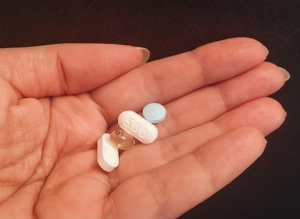Treatments for Type 2 Diabetes
Published 24 Feb 2016

If you have been diagnosed with T2 Diabetes that means that you have to take care of your health now more than ever. First of all you need to balance your life, change your diet, be sure to exercise, but medication will also play its part.
When it comes to choosing a treatment we often have no option either because it is what fits best our situation or because we weren’t given an option in the first place. But usually when having Type 2 Diabetes, there are different options we could explore, and it is good to know what each medication implicates so we can make the right choice for our condition.
1. Metformin: Metformin is usually the first medicine that's used to treat type 2 diabetes. It works by reducing the amount of glucose that your liver releases into your bloodstream. It also makes your body's cells more responsive to insulin.
Metformin is recommended for adults with a high risk of developing type 2 diabetes, whose blood glucose is still progressing towards type 2 diabetes, despite making necessary lifestyle changes.
If you're overweight, it's also likely you'll be prescribed metformin. Unlike some other medicines used to treat type 2 diabetes, metformin shouldn't cause additional weight gain.
However, it can sometimes cause mild side effects, such as nausea and diarrhoea, and you may not be able to take it if you have kidney damage.
2. Sulphonylureas: Sulphonylureas increase the amount of insulin that's produced by your pancreas. Examples of sulphonylureas include:
• glibenclamide
• gliclazide
• glimepiride
• glipizide
• gliquidone
You may be prescribed one of these medicines if you can't take metformin, or if you aren't overweight. Alternatively, you may be prescribed sulphonylurea and metformin if metformin doesn't control blood glucose on its own.
Sulphonylureas can increase the risk of hypoglycaemia (low blood sugar), because they increase the amount of insulin in your body. They can also sometimes cause side effects including weight gain, nausea and diarrhoea.
3. Glitazones (thiazolidinediones, TZDs): Thiazolidinedione medicines (pioglitazone) make your body’s cells more sensitive to insulin so that more glucose is taken from your blood.
They're usually used in combination with metformin or sulphonylureas, or both. They may cause weight gain and ankle swelling (oedema). You shouldn't take pioglitazone if you have heart failure or a high risk of bone fracture.
Another thiazolidinedione, rosiglitazone, was withdrawn from use in 2010 due to an increased risk of cardiovascular disorders, including heart attack and heart failure.
4. Gliptins (DPP-4 inhibitors): Gliptins work by preventing the breakdown of a naturally occurring hormone called GLP-1. GLP-1 helps the body produce insulin in response to high blood glucose levels, but is rapidly broken down. By preventing this breakdown, the gliptins (linagliptin, saxagliptin, sitagliptin and vildagliptin) prevent high blood glucose levels, but don't result in episodes of hypoglycaemia.
You may be prescribed a gliptin if you're unable to take sulphonylureas or glitazones, or in combination with them. They're not associated with weight gain.
5. GLP-1 agonists: Exenatide is a GLP-1 agonist, an injectable treatment that acts in a similar way to the natural hormone GLP-1.
It's injected twice a day and boosts insulin production when there are high blood glucose levels, reducing blood glucose without the risk of hypoglycaemia episodes.
It also leads to modest weight loss in many people who take it. It's mainly used in people on metformin plus sulphonylurea, who are obese. A once-weekly product has also been introduced.
Another GLP-1 agonist called liraglutide is a once-daily injection (exenatide is given twice a day). Like exenatide, liraglutide is mainly used for people on metformin plus sulphonylurea, who are obese, and in clinical trials it's been shown to cause modest weight loss.
6. Acarbose: Acarbose helps prevent your blood glucose level from increasing too much after you eat a meal. It slows down the rate at which your digestive system breaks carbohydrates down into glucose.
Acarbose isn't often used to treat type 2 diabetes because it usually causes side effects, such as bloating and diarrhoea. However, it may be prescribed if you can't take other types of medicine for type 2 diabetes.
7. Nateglinide and repaglinide: Nateglinide and repaglinide stimulate the release of insulin by your pancreas. They're not commonly used, but may be an option if you have meals at irregular times. This is because their effects don't last very long, but they're effective when taken just before you eat.
Nateglinide and repaglinide can cause side effects, such as weight gain and hypoglycaemia (low blood sugar).
What medication do you take? Does it work? What side effects have you had?
NHS
12 comments



 Facebook
Facebook Twitter
Twitter





